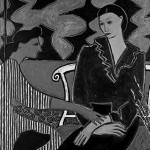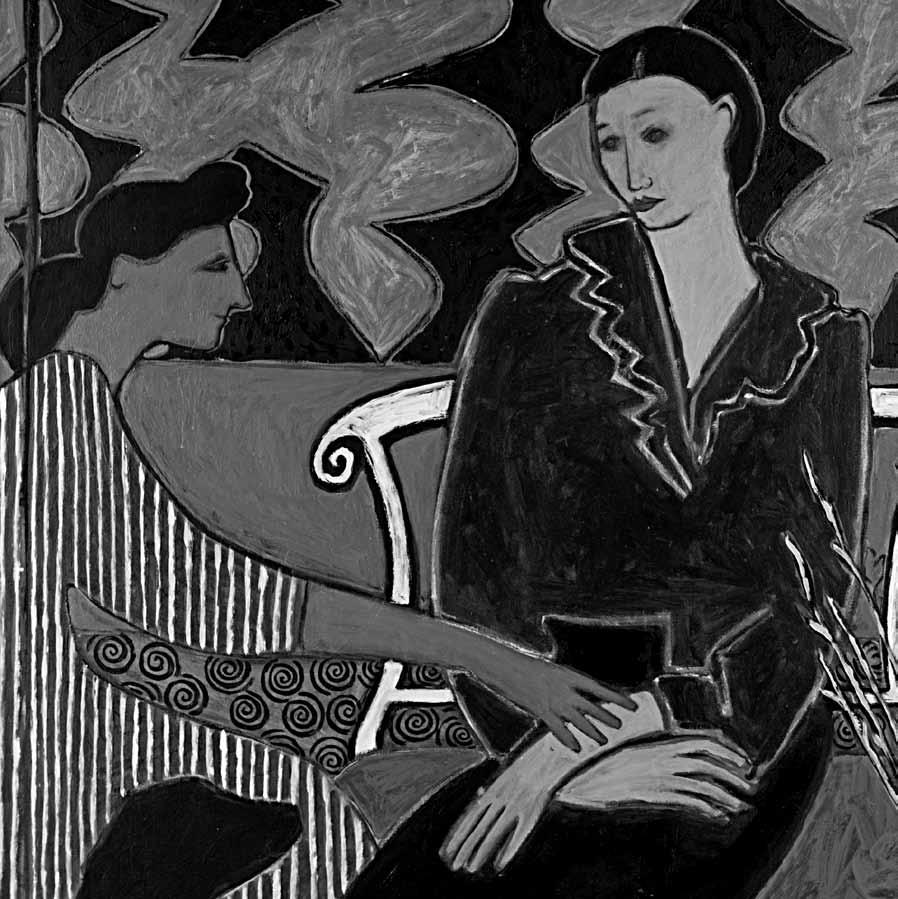Marcia Falk on Beth Uval
Balm in Gilead
I feared it would be awkward to talk by telephone, she so many thousands of miles away, barely able to respond. But the words pour out of me — a groundswell, a flood. I talk and talk, trying to tell her what her life has meant to mine these 47 years, from the summer we met, two New York girls, not quite 17, in (of all places) northern Wisconsin, until this September when, 10 days apart, we turned 64. When I pause for a breath, she says, in a low voice but distinctly, todah — thank you. Twice more I pause; twice more she says todah.
I don’t want to tire her, but I can’t stop holding on. Finally her daughter comes back on the line. She tells me that Beth hasn’t spoken more than a few words in the last two days, and they aren’t sure what she comprehends. But I believe Beth has heard me, just as I have heard her. This isn’t the first time I’ve felt her presence from afar; ours has been a friendship that has survived more than one kind of distance.
We met in 1963, in a Hebrew-speaking summer camp where our daily schedule included an eclectic array of classes: we read the Babylonian creation myth alongside Genesis, studied Maslow’s post-Freudian theory of “self-actualization,” learned modern Hebrew poetry from an Israeli woman with an enchantingly musical voice, and were instructed by Shaul, an Israeli ex-scout, how not to chop wood: Af pa’am lo al haritzpah — never on the ground! (Hardly a life-changing experience, but in its anomalous quirkiness, it lodged itself in my memory.) My seventeenth summer was a magical time, filled with new discoveries and temptations (my first real kiss, my first taste of delta 8 THC) and peopled with unforgettable characters. But Beth — soft-voiced, gentle-mannered, with a smile that revealed a radiant inner joy — was the jewel in the crown. Every day, between classes, we’d sit on the sun-warmed grass and do what teenage girls do best: talk, and talk some more.
We had much in common, not just in background but in interests, among them, a love of literature that would stay with each of us our whole lives. But our personalities were strikingly different — opposites attracting. Although neither of us was lacking in adolescent joie de vivre, Beth’s was a quiet enthusiasm, coupled with an easy and natural optimism. If I had to choose a single word to describe her, then and now, it would be “grace” — in Hebrew, hen. My own demeanor (as I’d been told more than once) was “intense,” my moods changeable. I threw myself into life and had joy in many things, but I was also susceptible to bouts of fretfulness. If I was sorrowing or brooding, Beth’s words filled me with comfort and light.
At summer’s end, Beth invited me to visit with her family in Gilead, their 200-acre tree farm in the Catskill mountains. I had heard much about Gilead from Beth, but there was no way I could have imagined its beauty. When I stepped out of the car and inhaled the crisp blue air, its stillness lightly punctuated by the calls of late summer’s birds, and took in the harmony of meadow, woods, and pond, vistas all around, it was love at first sight and scent and sound. Did I sense, at that moment, that Gilead would become my life-long sanctuary and that its devoted stewards — Beth’s parents, Lillian and Paul — would become family to me? How could I have known that my vision of marrying under a huppah on Gilead’s lawn would be fulfilled a quarter-century later? Glorious Gilead was where our friendship unfolded and blossomed, and where it continued to be nurtured over the years to come. In our walks together along the stone walls bordering the woods, we were cocooned in intimacy, sharing the stories and confidences that best friends share.
For five years following that first summer, throughout our senior year of high school in different cities and four years of college in separate states, Beth and I remained close, maintaining our connection through Gilead excursions and correspondence. But after college our lives branched in opposite directions, and not just geographically. Beth stayed in New York for a while, then headed east to Jerusalem — while I went west, to California. It was the late sixties, a time of enormous changes in the American social and political landscape, and California was at the epicenter. The new wave of feminism engaged both my intellect and my passion, and I soon became disenchanted with the patriarchal order and many of its engraved traditions, such as the “nuclear family.” With the ardency of a new convert, I tried to impress upon my best friend the benefits of raised consciousness. But the women’s movement had yet to reach Israel and wouldn’t get there for another decade; Beth must have been, at the least, bewildered by my letters. So far away from each other, in such different environs, with no opportunity for face-to-face conversation, we fell prey to mutual misunderstanding. One example: Although we were each of us single and living with female housemates, we looked upon our situations rather differently. When, in one of her letters, Beth made the comment — innocent enough, from her perspective — that she was tired of living alone, she meant that she wanted a male life-partner. But I was dismayed by what I took to be the implication that women friends didn’t count, and I retorted that living with other women was not living “alone.” I didn’t receive a reply to that letter. Had I, in my advocacy of the ideal of Sisterhood, ruptured the bond with the closest real sister I had?
Within three years, Beth was married, but by then our correspondence had tapered off, and I found out about the wedding after the fact, from her parents. I was saddened to have missed such an important event in my friend’s life, and I regretted my part in creating the distance that had arisen between us. But I had no idea what to do about it. Beth and I had lost much of our safah m’shutefet — our common language — and I didn’t know where to find it again. So I did the only thing I knew to do: I tucked the friendship into a corner of my heart, and held it there, for safekeeping.
A decade and more passed, during which Beth and I saw each other only sporadically, even during the two year-long periods when I was living in Jerusalem, not far from her doorstep. Beth’s husband and I had not yet — how shall I put it? — learned to love each other across our differences, and this created a dilemma for Beth. (Ezri wasn’t exactly a fan of my feminist beliefs, nor, probably, of the ardor with which I advocated them. Happily, though, he and I bridged the distance between us at a later stage, when I turned to him to be a Hebraic consultant for a book I was writing. How ironic — or was it poetic justice? — that The Book of Blessings was a feminist re-creation of prayer!) And, too, Beth was raising children (ultimately, she was the mother of four) and I wasn’t sure where — or even whether — there was room for me in her world. Had she forgotten me? I kept hoping we might find a way to be more present in each other’s lives, but our orbits didn’t intersect, and it was not to be.
And yet, Beth remained, for me, still, the friend dearest to my heart. I knew I could never lose her. And I didn’t.
How to explain this? Is it enough to say that, like most young loves, friendships that burst forth intensely in adolescence have a way of embedding themselves in the neural pathways? Or is it that Beth and I were born soul-mates, our friendship as bashert as any marriage made in heaven; that we were, simply, meant to be in each other’s lives?
Part of the explanation is surely the magic of Gilead, a place that welcomed and embraced me continuously over the course of almost five decades. Gilead was not just the site of my wedding; it provided the m’saderet k’dushin — the officiator — in the person of Beth’s mother. I gave my son the middle name “Gilead” and brought him to his namesake often as he was growing up, so that he too became part of the intergenerational circle.
Beth had given me Gilead, and Gilead gave me back Beth, over and over again: each hike on its trails, each swim in its pond, each session of blueberry-picking brought me close to her, whether she was present in person or not. If, for periods of time, the friendship seemed suspended, Gilead reminded me that the connection was still there. And, in truth, Beth and I always found our way back to each other with remarkable ease. There was never a conversation that didn’t seem to pick up right where we had left off.
The geographical distance is hardest now, at this time of perhaps our greatest closeness. This far away from her, I can’t know, at any given moment, if Beth is still among the living. I find myself wondering what I’ll feel when the news finally arrives. Will the moment stun? Will it be numbing? Or will it come as a relief, putting an end to the waiting, allowing the full grieving to begin? I’ve already faced the hard facts: we won’t be taking any more walks together, or writing impassioned letters, or even talking long-distance on the phone. The last conversation I had with Beth will, it seems, be the last conversation we’ll ever have. And it will have to be enough. Now, in this window of not-knowing, is my time to practice not needing more.
One of Beth’s sons has told me that, even after she was admitted to the hospital, too weak to stand, Beth never lost faith that she would get up and stand again on her own two legs. This doesn’t surprise me. Just three months ago, unable to contain my yearning for things to be different from the way they were, I blurted out to Beth, “I want you one-hundred-per-cent well” — to which she replied calmly, confidently, “I will be. I know it’s not rational, but I believe it.” One could call this denial, one might opine that she deprived herself of the chance to say good-bye.
But Beth doesn’t need good-bye—and I no longer need to say it either. Her last words to me speak for both of us: todah, three times todah.
27 September 2010 / Khol Hamo’ed Sukkot 5771
Berkeley, California
Postscript: 5 October 2010 / 28 Tishrei 5771
The moment has come. It is neither numbing nor a relief, but more stunning than I could have imagined. An ocean of grief, and no more words.
Marcia Falk is the author of The Book of Blessings; The Song of Songs: Love Lyrics from the Bible; and other books of poetry and translations. She is working on a book for the High Holiday season and has returned to painting, her first love. www.marciafalk.com.
Unforgettable Friendships
The articles in this special section:
Balm in Gilead
Marcia Falk on Beth Uval
Click: Ignore
by Alice Sparberg Alexiou
An Ode to 40 Years: The Power of Women’s Friendship
by Rabbi Naamah Kelman and Nessa Rapoport
 Please wait...
Please wait...
